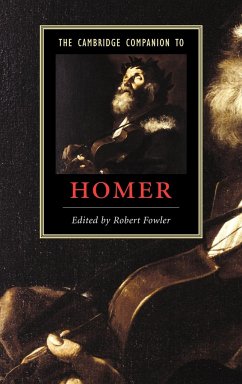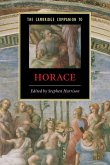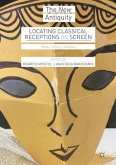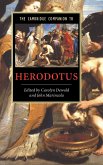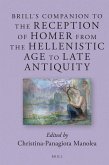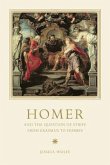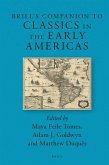Short description/annotation
This work examines the composition of the Iliad and the Odyssey and their subsequent reception.
Main description
The Cambridge Companion to Homer is a guide to the essential aspects of Homeric criticism and scholarship, including the reception of the poems in ancient and modern times. Written by an international team of scholars, it is intended to be the first port of call for students at all levels, with introductions to important subjects and suggestions for further exploration. Alongside traditional topics like the Homeric Question, the divine apparatus of the poems, the formulae, the characters and the archaeological background, there are detailed discussions of similes, speeches, the poet as story-teller and the genre of epic both within Greece and worldwide. The reception chapters include assessments of ancient Greek and Roman readings as well as selected modern interpretations from the eighteenth century to the present day. Chapters on Homer in English translation and 'Homer' in the history of ideas round out the collection.
Table of contents:
Introduction Robert Fowler; Part I. The Poems and their Narrator: 1. The Iliad: an unpredictable classic Donald Lateiner; 2. The Odyssey and its explorations Michael Silk; 3. The story-teller and his audience Ruth Scodel; Part II. The Characters: 4. The gods in the Homeric epics Emily Kearns; 5. Manhood and heroism Michael Clarke; 6. Gender and Homeric epic Nancy Felson and Laura Slatkin; Part III. The Poet's Craft: 7. Formulas, metre and type-scenes Matthew Clarke; 8. Similes and other likenesses Richard Buxton; 9. The speeches Jasper Griffin; Part IV. Text and Context: 10. Epic as genre John Miles Foley; 11. The epic tradition in Greece Ken Dowden; 12. Homer's society Robin Osborne; 13. The Homeric question Robert Fowler; Part V. Homeric Receptions: 14. Homer and Greek literature Richard Hunter; 15. Roman Homer Joseph Farrell; 16. Homer and English epic Penelope Wilson; 17. Homer and the Romantics Timothy Webb; 18. Homer and Ulysses Vanda Zajko; 19. Homer: the history of an idea James Porter; 20. 'Shards and suckers': contemporary receptions of Homer Lorna Hardwick; 21. Homer in English translation George Steiner.
Hinweis: Dieser Artikel kann nur an eine deutsche Lieferadresse ausgeliefert werden.
This work examines the composition of the Iliad and the Odyssey and their subsequent reception.
Main description
The Cambridge Companion to Homer is a guide to the essential aspects of Homeric criticism and scholarship, including the reception of the poems in ancient and modern times. Written by an international team of scholars, it is intended to be the first port of call for students at all levels, with introductions to important subjects and suggestions for further exploration. Alongside traditional topics like the Homeric Question, the divine apparatus of the poems, the formulae, the characters and the archaeological background, there are detailed discussions of similes, speeches, the poet as story-teller and the genre of epic both within Greece and worldwide. The reception chapters include assessments of ancient Greek and Roman readings as well as selected modern interpretations from the eighteenth century to the present day. Chapters on Homer in English translation and 'Homer' in the history of ideas round out the collection.
Table of contents:
Introduction Robert Fowler; Part I. The Poems and their Narrator: 1. The Iliad: an unpredictable classic Donald Lateiner; 2. The Odyssey and its explorations Michael Silk; 3. The story-teller and his audience Ruth Scodel; Part II. The Characters: 4. The gods in the Homeric epics Emily Kearns; 5. Manhood and heroism Michael Clarke; 6. Gender and Homeric epic Nancy Felson and Laura Slatkin; Part III. The Poet's Craft: 7. Formulas, metre and type-scenes Matthew Clarke; 8. Similes and other likenesses Richard Buxton; 9. The speeches Jasper Griffin; Part IV. Text and Context: 10. Epic as genre John Miles Foley; 11. The epic tradition in Greece Ken Dowden; 12. Homer's society Robin Osborne; 13. The Homeric question Robert Fowler; Part V. Homeric Receptions: 14. Homer and Greek literature Richard Hunter; 15. Roman Homer Joseph Farrell; 16. Homer and English epic Penelope Wilson; 17. Homer and the Romantics Timothy Webb; 18. Homer and Ulysses Vanda Zajko; 19. Homer: the history of an idea James Porter; 20. 'Shards and suckers': contemporary receptions of Homer Lorna Hardwick; 21. Homer in English translation George Steiner.
Hinweis: Dieser Artikel kann nur an eine deutsche Lieferadresse ausgeliefert werden.

